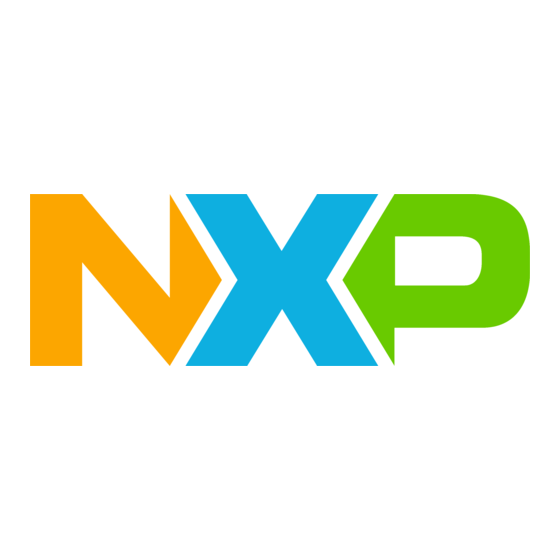
Table of Contents
Advertisement
Quick Links
Advertisement
Table of Contents

Subscribe to Our Youtube Channel
Summary of Contents for NXP Semiconductors NFC Tandem
- Page 1 NFC Tandem User Manual Rev. 0.2 — 17 August 2018 User manual COMPANY PUBLIC Document information Information Content Keywords NFC, PN7150, NTAG-I2C plus Abstract This user manual describes the design, the use and the software aspects of the NFC Tandem board.
- Page 2 NFC Tandem User Manual NXP Semiconductors Revision history Date Description 20180817 Fix broken links 20171017 Initial version 447202 All information provided in this document is subject to legal disclaimers. © NXP B.V. 2018. All rights reserved. User manual Rev. 0.2 — 17 August 2018...
-
Page 3: Introduction
C plus remaining accessible from the host through the I interface. This document first gives an overview of the use cases offered by NFC Tandem. Then it presents the NFC Tandem reference design, providing matching guidelines and pointing to the related software ressources. -
Page 4: Use Cases
The following examples relates to Gateways and Set Top Boxes applications but are of course not exhaustive and could also be applicable to some other applications. Those use cases are shown using NFC Tandem demonstration setup (see Section 2.1 Service configuration... -
Page 5: Nfc Tandem Reference Design
NXP Semiconductors NFC Tandem reference design 3.1 Schematics Figure 1. NFC Tandem reference design schematics - PN7150 and connectors Figure 2. NFC Tandem reference design schematics - NtagI2C and antenna 447202 All information provided in this document is subject to legal disclaimers. -
Page 6: Matching Guide
NFC Tandem User Manual NXP Semiconductors 3.2 Matching guide The NFC Tandem reference design comprised of 2 matching/tuning areas, respectively for PN7150/NTAG I C plus, influencing each other. Figure 3. NFC Tandem matching/tuning 3.2.1 Step 1 - Reader matching • Plug TX1 and TX2 to an NWA/NVA and enable the switching transistors (VBAT = High/3V3/5V) •... -
Page 7: Step 2 - Ntag Tuning
NFC Tandem User Manual NXP Semiconductors Figure 4. NFC Tandem reader matching 3.2.2 Step 2 - Ntag tuning • Disable switching transistors (V_BAT = low/GND) • Place 33pF for C11 & C12 – Outcome will be that resonance frequency will be lower than 13,56MHz –... -
Page 8: Step 3 - Re-Adjust Reader Matching
NFC Tandem User Manual NXP Semiconductors Figure 5. NFC Tandem Ntag tuning 3.2.3 Step 3 - Re-adjust reader matching • Now the C9 & C10 values defined in Step 1 need to be re-adjusted – Therefore enable reader mode / disable NTAG •... -
Page 9: Step 4 - Check Ntag Tuning
NFC Tandem User Manual NXP Semiconductors Figure 6. NFC Tandem reader matching re-adjusting 3.2.4 Step 4 - Check Ntag tuning • Enable NTAG mode (see Step 1) • Check resonance frequency – Use contactless method to check reflection on the antenna –... -
Page 10: Nfc Tandem Demonstration
Figure 7. NFC Tandem board 4.1 Hardware setup In order to run NFC Tandem demonstration, the following hardware pieces are required: ¤ a microSD card of at least 4Gb (2Gb sufficient for Raspberry Pi setup) ¤ and a computer board, either: •... -
Page 11: Smartphone Counterpart Device
2. Write the image to µSD card following instructions for Raspberry Pi (see [11]) or UDOO Neo (see [12]) 3. Assemble the NFC Tandem board on the Raspberry Pi or UDOO Neo and insert the µSD card 4. Format* the NTAG I C plus embedded in the Tandem board using ‘NTAG I2C Demo’... -
Page 12: Demonstration
NFC Tandem demo page (previously opened from the NFC phone following previous step). In the NFC Tandem demo page, a button allows to write NDEF information (NDEF Text message simulating an error log) to the NTAG I C plus memory via the I 447202 All information provided in this document is subject to legal disclaimers. -
Page 13: Demo #1 Service Configuration
4.4.2 Demo #2 WiFi connection and IoT nodes pairing Pre-requisite: continue right after demo #1. 1. Tap the phone to the NFC Tandem (board still powered on), PN7150 will “push” Wifi credentials to the phone which then gets connected to the WiFi network. -
Page 14: References
[7] NXP TagWriter https://play.google.com/store/apps/details?id=com.nxp.nfc.tagwriter [8] NTAG I2C Demoboard https://play.google.com/store/apps/details? id=com.nxp.ntagi2cdemo [9] NFC Tandem demo image for Raspberry Pi https://community.nxp.com/external-link.jspa?url=https%3A%2F%2Fwww.nxp.com %2Fdoc%2FTANDEM-RPI-LINUX [10] NFC Tandem demo image for UDOO Neo https://community.nxp.com/external-link.jspa?url=https%3A%2F%2Fwww.nxp.com %2Fdoc%2FTANDEM-UDOO-LINUX [11] Raspberry Pi instructions for flashing image to SD card https://www.raspberrypi.org/documentation/installation/installing-images/... - Page 15 NFC Tandem User Manual NXP Semiconductors [14] WiPi - WLAN USB Module, 802.11n http://www.newark.com/element14/wipi/module-wifi-usb-for-raspberry-pi/dp/07W8938 447202 All information provided in this document is subject to legal disclaimers. © NXP B.V. 2018. All rights reserved. User manual Rev. 0.2 — 17 August 2018...
-
Page 16: Legal Information
Customer is responsible for doing all necessary testing for the customer’s applications and products using NXP Semiconductors products in order to avoid a default of the applications and the products or of the application or use by 6.2 Disclaimers... - Page 17 NFC Tandem User Manual NXP Semiconductors Figures Fig. 1. NFC Tandem reference design schematics Fig. 6. NFC Tandem reader matching re-adjusting ..9 - PN7150 and connectors ......... 5 Fig. 7. NFC Tandem board ........10 Fig. 2. NFC Tandem reference design schematics Fig.
-
Page 18: Table Of Contents
Use Cases ............4 Service configuration ......... 4 WiFi and IoT node pairing ......... 4 Error diagnostic and assistance ......4 NFC Tandem reference design ......5 Schematics ............5 Matching guide ..........6 3.2.1 Step 1 - Reader matching ......... 6 3.2.2...

Need help?
Do you have a question about the NFC Tandem and is the answer not in the manual?
Questions and answers